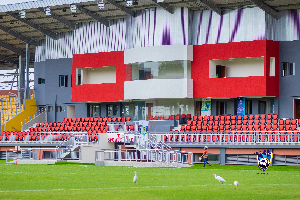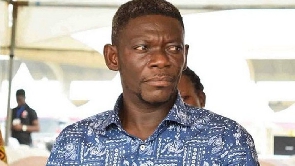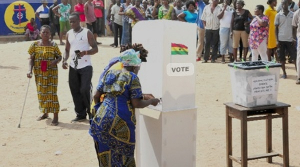Regional News of Thursday, 12 April 2012
Source: GNA
Politicians urged to prioritize environmental sustainability in manifestos
Participants at a workshop on the negative effects of mining on health and the environment have demanded that political parties and independent candidates prioritize environmental sustainability in their manifestos and electioneering campaign messages.
They should also outline “clear and specific policies” on how they intend to add value to gold by way of setting of a gold refinery.
This was contained in a communiqué issued at the end of a two-day workshop dubbed “Life is more precious than gold; Time to talk and time to act on negative health and environmental effects of mining for peaceful elections 2012” held at the Asutifi North District Assembly Hall in the Brong Ahafo Region.
The event was organized by the Centre for Environmental Impact Analysis (CEIA), Humanity Focus Foundation (HFF) and Gender and Environmental Monitoring Advocate (GEMA).
It was funded by STAR-Ghana, through financial contributions from the British Department for International Development (DFID), the Danish International Development Agency (DANIDA) and European Union (EU).
Representatives of political parties, chiefs from Kenyasi No. 1, Kenyasi No. 2 and Ntotroso Traditional Councils, Assembly Members, journalists as well as residents of mining communities in the Asutifi North Constituency in the Brong Ahafo Region attended the two-day workshop.
The participants asked politicians to formulate policies to address the negative effects of mining on health of residents of mining communities and also commit themselves to a total review of the Minerals and Mining Act as well as other environmental laws in the interest of the nation.
They should also undertake comprehensive cost-benefit analysis of surface mining and place premium on land for agricultural purposes.
They asked Government to establish well-equipped laboratory for the Environmental Protection Agency (EPA) to determine the presence of cyanide, heavy metals and other toxic chemicals in the environment, and resource the National Commission for Civic Education (NCCE) to educate residents of mining communities and the general public on mining laws and policies relating to the natural resource and environment sector.
“Government should as a matter of urgency stop the use of military and other security agencies to brutalize residents of mining communities anytime the residents follow due process to demonstrate against mining companies.”
The communiqué said Government must review the Minerals and Mining Act to allow affected land owners in mining communities to fix their annual ground rent rate, and said the current rate as fixed by the Land Valuation Board is 0.50 pesewas per one square kilometer (1Km2), which participants described as too low.
They asked the Ministry of Lands, Natural Resources, Minerals Commission and the Environmental Protection Agency to develop and pass “Blasting Standards” to guide the operations of mineral right holders.
They resolved that, they would ensure that there was peace in the country before, during and after the 2012 presidential and parliamentary elections and called on political parties, media commentators and the general public to refrain from the use of “hate speech”.
They appealed to journalists to ensure that their reportage was devoid of “hate speech” that could trigger conflicts in the upcoming elections while they prioritised mining and environment issues in their reportage on the 2012 elections.**










